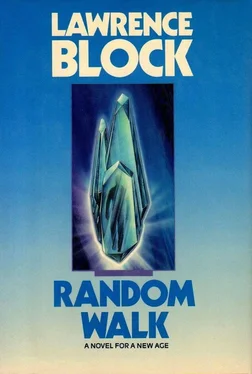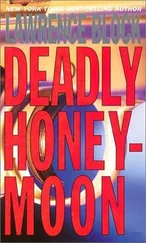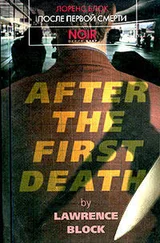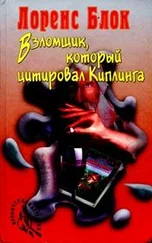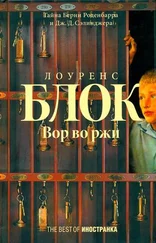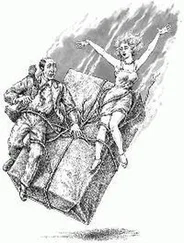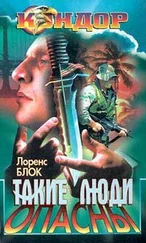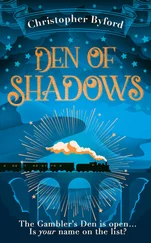“Well, a different shirt and my other jeans. And I put on an extra pair of socks.”
“And that little windbreaker, I guess.”
“Yes.”
“And that’s all?” McLemore stared at him. “Weren’t you cold?”
“A little, but it wasn’t bad. I had a fire.”
“A fire.”
“A campfire, I let it burn down when I went to sleep. I suppose it was against the law, but—”
“Forget the law. You slept out in the open last night in your clothes. No tent, no sleeping bag, no blanket. Mister, are you telling me a story?”
“What do you mean?”
“Maybe you parked down the road. Maybe you drove here from Roseburg.”
“Why would I do that?”
“Don’t ask me. Maybe you’re one of those psychological liars, or maybe you don’t want anybody seeing your car. Or maybe you just want to see if you can make a fool out of a person.”
“I don’t know what you’re talking about.”
“You know what the temperature got down to last night, mister? The low forties, and it wouldn’t have been any warmer closer to Toketee. You sleep without cover on a night like that and you’d wake up chilled to the bone, providing you woke up at all. A man’d freeze to death, likely as not, sleeping out like you said you did.”
Guthrie looked at him.
“You expect me to believe you, mister?”
He stood up. “You can believe whatever you want,” he said. “It doesn’t make a whole lot of difference to me. Thanks for the coffee.” He walked to the door, opened it. “It didn’t seem all that cold,” he said.
South of Diamond Lake the road forked, with 138 swinging to the right and heading east along the northern border of Crater Lake National Park. There was a little more traffic on this part of the road, and it would be heavier in July and August, when the tourists came.
The Fair Harbor Inn gave you complimentary coffee and doughnuts in the morning, but he hadn’t wanted to deal with McLemore at that hour, so he’d stopped for breakfast on his way out of town. He stopped again at an Amoco station for a Coke around eleven and realized he hadn’t had a cigarette since the one he’d taken a puff of after dinner the previous night.
He thought about that, and about having slept out on a cold night without having much felt the cold. Maybe the two phenomena went together, maybe nicotine withdrawal generated heat.
Did he want a cigarette now?
No, he decided. He didn’t. He seemed to have lost the habit, as if he had walked out from under it just as he’d walked out from under all the encumbrances of his life. His apartment, his job, his car, his friends, his books, his records, his furniture, most of his clothes, he’d walked away from them all, sloughing them off like a snake shedding its skin.
The image, he decided, was an apt one. He was walking away from all the parts of himself that he had outgrown. Somehow, evidently, he had outgrown the need for tobacco, because God knew he’d never had the intention of quitting. He hadn’t quit. Quitting had simply happened to him.
And the night in the woods?
Maybe McLemore had been wrong about the temperature. Maybe it had indeed been warmer closer to Toketee Falls. Maybe the trees, besides breaking the wind, had served to hold in the heat from the campfire.
One of these nights he’d have to try it again, and see what happened.
But not that night. Diamond Lake Junction wasn’t much more than a crossroads, but there were a couple of motels positioned to catch tourists en route to Crater Lake. He stayed in one that got WTBS on cable, and he watched the Braves shut out the Dodgers in L.A. During commercials he kept looking at the map, and in the morning he looked at it again. He could go north on US 97 toward Bend, or he could go south to Klamath Falls. He looked at the map, and he tried to calculate the best route to, well, to wherever he was going.
His mind kept juggling possibilities. Klamath Falls was closer, but from Bend he could proceed more directly east. Then too, the first dot on the map south of Diamond Lake Junction was forty miles away, while if he headed north there were towns spaced at fairly frequent intervals. On the other hand, he’d probably find places to stay whether or not there were dots on the map, and he could always sleep in the woods again and find out if he froze to death this time. On the other hand—
North .
Not a voice in his head this time, but something close to it. Counsel from some source within or without him. Go north, it gave him to understand. Don’t work things out, don’t try to think your way through it. Just listen, and you’ll always know where to go.
He hadn’t shaved since leaving Roseburg, which seemed to indicate that he was growing his beard back. Now, after the better part of a week, there was enough there to trim up a little. He didn’t like the way it felt on his neck, and he didn’t like the way the whiskers grew almost to his eyes.
He lathered his neck and shaved it, and he shaved around his cheekbones, and then he said the hell with it and shaved the rest of it, too.
He seemed to have given up deciding things, he realized. It looked as though the only way for him to find out what he was going to do was to wait and see what he did.
Earlier he’d had remarkably good weather. It had rained some since he left Roseburg, but never while he was out in it. It rained evenings while he was inside, and the other day he’d waited out a brief downpour in a service station, but he’d managed the trick of getting across the Cascades without once getting caught in the rain. Rain was still a possibility on this side of the mountains — he was a long ways yet from the state’s eastern desert — but it was less likely, and it wasn’t something he had to worry about this particular day.
Because the weather was perfect, with the sun bright and warm in a startlingly blue sky, and only a few puffs of cloud high overhead. He walked along, keeping a fairly brisk pace with no effort, the pack riding easily on his shoulders.
Two hours out of Diamond Lake Junction, and perhaps that many miles past a clutch of houses and stores called Beaver Marsh, he heard a horn sound on the other side of the road. He turned to see a dark blue Datsun pickup, the window rolled down on the driver’s side and a man’s face looking at him. The man was motioning for him to come over.
There was no traffic in either direction. He crossed the road, and the fellow said, “Hey, hop in. Toss your gear in the back and come on around.”
“Thanks,” he said, “but I’m walking.”
“Well, I can see that, hoss. If you was driving, I wouldn’t have stopped for you.”
“I appreciate it,” he said. “But I don’t really want a ride.”
“Something wrong with my truck?”
“Not that I can see. I’m just out for a walk, that’s all.” The fellow scratched his head. He looked to be in his late twenties, with a lot of strawberry blond hair and an inch-wide strip of beard the same color running down along the edge of the jawline. His upper lip was shaved clean, as were his cheeks and neck. He was thick in the chest and big in the arms, and he had a tattoo on his left forearm showing a spider in its web. He was wearing an Olympia Beer gimme cap and a red T-shirt with nothing written on it.
He said, “Just out for a walk.”
“That’s right.”
“I always figure why walk when you can ride, but you can suit yourself, I guess. Where you headed?”
“East.”
The fellow grinned, showing crooked teeth. “Well, shit,” he said. “Where you’re goin’s north.”
“I know. I’m going north as far as Bend, and then—”
“You’re walking to Bend ?”
Читать дальше
